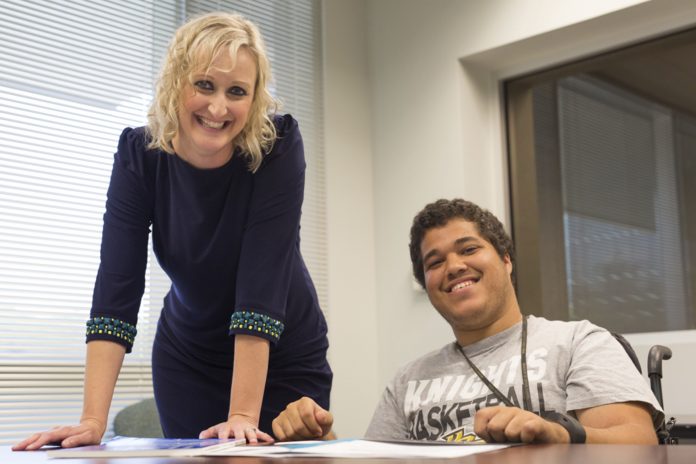
Central Floridians who have developed a neurological disorder as a result of an accident or disorder can now join recreational teams through a new organization at the University of Central Florida.
The UCF Adaptive Community Outreach Program is opening up sports teams, a theater production, and an Aphasia choir adapted to fit the needs of neuro-atypical conditions. Participants can join as many teams as they’d like for free.
Megan Sherod, a UCF neuropsychologist and clinical associate professor, is the founder of the new program which will begin as more participants register. Sherod said that this is a program that she has had in the works for some time, after working with patients who have become neuro-atypical.
“I wanted to have something that was mine, where I could give back to the community, but that also really answered a need that patient after patient after patient of mine, as a neuropsychologist, told me,” Sherod said.
The program runs through the university, but is open to anyone in the Orlando area over the age of 18 and that was once neurotypical but has since become neuro-atypical. Activities include sitting volleyball, wheelchair basketball, softball, acting and script-writing positions in theater, and a choir for those with acquired speech disorders. The activities will have modified equipment to fit the needs of those participating, such as beeping balls for those with visual impairments to detect where the ball is by sound and costumes made for those in wheelchairs.
“It’s a need in the community, it’s novel, it’s innovative,” Sherod said. “I’ve never seen anything of this scale out there.”
Sherod consulted with Robert Pritchard, a former UCF football player who while at his home in Georgia, suffered a massive stroke in 2012 that led to speech and physical impairments. He helped guide Sherod in developing the sport aspect of the project.
The Adaptive Community Outreach Program also affects the volunteers of the event. One in particular, Jonathan Trufant, will be coaching for the wheelchair basketball team despite having cerebral palsy, a condition that affects muscle tone, movement, and motor skills.
“It’s really hard to put yourself out there when you have a disability,” Trufant, a senior psychology student, said. “I really wanted to get involved with that because that’s something I needed when I was a kid, so I’m personally invested in it, because of my disability.”
Trufant’s dedication to the program hits home for Sherod.
“My mantra for all of my students and all of my patients are, ‘You matter.’ Period,” Sherod said. “And I feel like Jonathan really validates that he believes in this program, and to have somebody who can truly empathize with what some of the participants are going through, with some of the physical challenges, but who also believes in this program so much — he’s probably my biggest cheerleader of everyone.”
Over 60 volunteers from UCF students, faculty and staff are needed to run the program. As of Sept. 27, eight days after the campaign was launched, the 60-person quota was filled and exceeded.
“Being disabled, you live a very sheltered life, and you don’t meet very many people,” Trufant said. “It’s a good opportunity for them to get out there and get out of their shell and learn how to interact with people in a safe, controlled environment where they’re around people that share their same diagnoses or what have you.”
A grant from the Office of the Quality Enhancement Plan at UCF helped make the program possible through July 2019. Ultimately, Sherod hopes to enhance UCF’s partnership with the local neurological community, as well as become a registered student organization for those who have become neuro-atypical.



